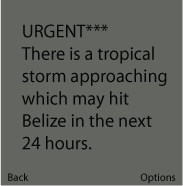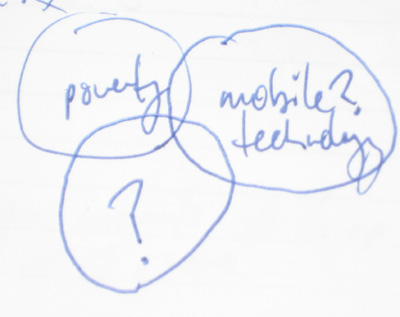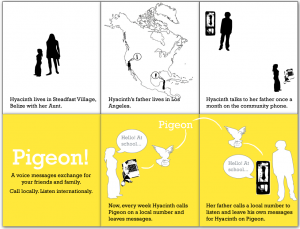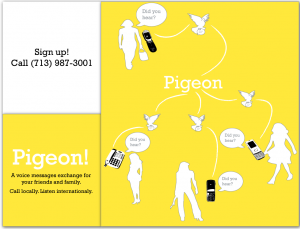Adam Baker, Google, on Google
Google Design in Practice: the Challenge of Simplicity on iTunesU.
Adam Baker works for Gmail and specifically worked on Gchat. He talks about things design (rapid prototyping, scoping, etc.) and how that work in a corporate, engineering environment (Google).
prototype_0
A role prototype about mobile banking. It doesn’t say much more than what is possible with mobile banking right now. You can currently transfer credit via SMS to another pre-paid account. What I’m considering here is how people could use cell phone credit as currency.
I’d really like to pursue some project in mobile banking, but money issues may put research into that beyond the scope of possibilities.
“Problems and dsolutions with interactive devices” - Harold Thimbleby
Available on iTunesU: Problems and dsolutions with interactive devices
In this talk, Harold Thimbleby, of FIT Lab, is arguing that design (and life) problems can be effectively exposed through telling good stories. The story format Thimbleby advocates for is a “dstory,” a video under 2 minutes with still images and voice over.
Dstories have the ability to shine light on problems which are generally accepted or overlooked in daily operation. They use a particular incident to highlight a particular design problem by connecting to people you want to take action.
The Dstory method could be interesting for prototyping. Thimbleby’s talk also highlights how annoying it is to quickly create and store video files.
Nico Muhly, Jhumpa Lahiri
I used a Nico Muhly song in a public installation I did last year. His new album, Mothertonuge, is beautiful.
Jhumpa Lahiri’s Unaccustomed Earth, which I just finished reading, is also beautiful.
Additionally: my LastFM profile
“A Primer on Smart Cards”
A Primer on Smart Cards, David Pouge
via Carrie Mae
Prototypes_0
I need to get my brain thining in prototype mode, so I made myself make a look-and-feel and a role prototype. Here they are:
Look-and-feel prototype for an SMS hurricane/tropical storm alert system for Belize. It could be a national system. It could be law that when a person buys a cell phone they must enroll or be asked if they’d like to enroll in the alert system.

There are huge technical issues here, but for me one big issue is how this would be made sustainable for the long-term. Would it survive politcal transition? What would it take to have people trust this as a reliable source of information? Perhaps, who should the SMS come from for it to be trusted? An NGO or the government?
Role prototype for an imaginary SMS based system which helps streamline micro-business operations.
In work I’ve done with volunteer groups looking into micro-business management, business-owners have had very low skills with money managment and other basic busienss planning. If such a system were to exist, what would be most useful? If fincancial information was being transmitted, what would need to be done for business owners to be comfortable with using the system?
More generally: what are tasks that people use computers for that mobile phones could replace, allowing greater access to people living in poverty who can much more easily (financially and logistically) purchase a phone versus a computer?
Question, Domains
So, I’m working on my questions and my domains.
My (too general) thesis question: How can creative uses of (mobile?) technology improve the lives of those living in poverty?
This needs to be honed down with at least one more specification rather quickly. This Venn Diagram show this idea a bit more neatly:
“The World is Flat 3.0″ Thomas Friedman
This talk of Friedman’s from 2007 summaries up much of his thoughts about globalization from his book The World is Flat. It seemed worthwhile to watch as it provides the context for much of the general public about technology in emerging nations.
Friedman talks of 3 eras of globalization:
- Globalization 1.0 1492-early 1800 (large to medium, countries went global)
- Globalization 2.0 early 1800s-2000s (medium to small, spearheaded by companies for market and labor)
- Globalization 3.0 2000-present (small to tiny, spearheaded by individuals)
Friedman asserts that ideas, especially ideas about technology, are now widely distributed by individuals and that this impact will only continue.
available on iTunesU - “The World is Flat 3.0“
“Design, Innovation and Leadership” - Carole Bilson
“Design, Innovation and Leadership” podcast from the University of Michigan Penny W. Stamps Distinguished Visitors Series
Response: There’s not that much here for me. Bilson thought that designers could make a bigger impact in companies and wanted to prove it. It’s mostly corporate ideas. Bilson works for an mailing documents company, and one perhaps interesting thing brought to my attention was the use of indicia, which I thought might have some vauge connection to mobile banking.
Where I’m coming from
This is a re-post of my wrap-up of my mini-thesis last semester, Pigeon. You can find it and the process leading up to it on the Computation08 blog. Perhaps Pigeon is the right place for me to move forward, but I’m going to try to prototype outside of it a bit more.
In an attempt to facilitate communication between people with limited technological access through the creation of an experimental phone-based social network, Pigeon was created. Pigeon is a voice message exchange system for friends and family. The idea of this project began with a desire to connect loved ones who live far away and are unable to communicate as often as they might desire, such as a young girl who lives in Belize and her father who lives in Los Angeles, working several jobs to send money back home to their family, who can only communicate with an international call once a month. The Pigeon concept provides an interesting idea for asynchronous phone-based message exchange, which has the potential to bridge communication barriers by employing accessible and affordable communication technology as a means for individual to tell their personal story, or what is currently happening in their life.
You can call in and interact with the current version of Pigeon: (713) 987-3001. Use member number 999-999-999 and PIN 9999. After logging on, options 1 (listen to message), 2 (record a message), and 6 (record Pigeon name, which is the system identifier, like a Facebook picture) are active.
Print materials, which in a comic/storyboard form explain Pigeon and it’s features. They are designed to be folded up and attached to “phone cards”:
For more information, see the presentation, an interactive quicktime.





